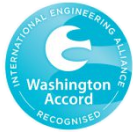
-
About
-
Faculty
-
Student Information
-
Teaching & Research
-
Admissions
-
Downloads
- News
- Internship
- Industry-Academia



| Educational Objectives | Core Competencies |
|---|---|
| 1.Professional Knowledge and Skills: We offer students fundamental and theoretical courses in electrical engineering to develop highly specialized and proficient engineering talents. | 1.Electrical Engineering Expertise: Students will possess fundamental knowledge and skills in electrical engineering. |
| 2.Practical Skills: We help sharpen students' practical skills through the integration of theoretical knowledge with project-based learning, hands-on experiment, and internship courses. | 2.Engineering Analysis: Students will be competent to summarize, analyze, and integrate engineering practices. |
| 3.Teamwork: We help enhance students’ communication abilities and teamwork, and foster well-rounded character traits. | 3.Teamwork: Students will possess effective communication and self-expression skills, as well as the ability to work collaboratively in teams. |
| 4.Lifelong Learning: We train students to seek continuous self-improvement and cultivating their willingness and ability for lifelong learning. | 4.Continuous Learning: Students will be equipped with the ability for self-directed learning and further education, putting the concept of lifelong learning into practice. |
| 5.Engineering Ethics: We instill in students a work ethic characterized by envision, perseverance, precision, and diligence, while fostering an understanding of engineering ethics. | 5.Professional Ethics: Students will be aware of professional ethics and social responsibility. They will adhere to intellectual property rights and professional ethics. |
| 6.Diverse Education: We provide a diversified curriculum and learning environment to nurture talents that meet the demands of the society and international development. | 6.Global Perspective: Students will gain a deep understanding of international development trends in relevant industries and the ability to meet the challenges of global competition. |
| Educational Objectives | Core Competencies |
|---|---|
| 1.Professional Knowledge and Skills: We offer courses in electrical engineering theory and engineering research to cultivate highly specialized and proficient engineering talents. | 1.Electrical Engineering Expertise: Students will possess specialized knowledge in the field of electrical engineering |
| 2.Practical Skills: We help develop students' practical skills through the integration of theoretical application and simulation, experimentation, and hands-on projects. | 2.Research Execution: Student will be able to demonstrate the ability to plan, execute, and write professional papers on research projects. |
| 3.Teamwork: We help to foster students’ communication abilities and teamwork, cultivating well-rounded personal traits. | 3.Communication and Coordination: Students will possess effective communication skills and the ability to coordinate with talents from different fields. |
| 4.Lifelong Learning: We will instruct students in the importance of continuous self-improvement and further enhance their willingness and abilities to lifelong learning. | 4.Innovative Thinking: Students will have the ability to think independently and innovatively to solve problems in electrical engineering. |
| 5.Engineering Ethics: We help students develop the working attitude shaped with envision, perseverance, precision, and diligence. We also help students to develop engineering ethics. | 5.Ethical Responsibility: Students will have a strong awareness of professional ethics and social responsibility, meanwhile sticking to intellectual property rights and professional ethics. |
| 6.Diverse Education: We provide a diversified curriculum and learning environment to cultivate talents that align with societal trends and international development. | 6.Global Competence: Students will have an in-depth understanding of international development trends in relevant industries and the competence to respond to the challenges of global competition. |
| Term | Tenure | Name |
|---|---|---|
| 1 | 1967/08 - 1973/07 | Yang-Shu Sung |
| 2 | 1973/08 - 1976/07 | Guo-En Hung |
| 3 | 1976/08 - 1978/07 | Jin-Yuan Shiu |
| 4 | 1978/08 - 1984/07 | Guo-En Hung |
| 5 | 1984/08 - 1987/07 | Ching-Shiang Li |
| 6 | 1987/08 - 1990/12 | Wen-Liang Huang |
| 7 | 1991/01 - 1994/07 | Jau-Shiang Wu |
| 8 | 1994/08 - 1995/07 | Hung-Liang Jou |
| 9 | 1995/08 - 1996/07 | Ling Hung |
| 10 | 1996/08 - 1996/07 | Meng-Ren Chen |
| 11 | 1996/08 – 2000/07 | Chun-Hsiung Fang |
| 12 | 2000/08 - 2003/07 | Ming-Yuan Juo |
| 13 | 2003/08 - 2006/07 | Meng-Tang Chen |
| 14 | 2006/08 - 2009/07 | Jia-Hung Lin |
| 15 | 2009/08 - 2012/07 | Hsiao-Yi Lee |
| 16 | 2012/08 - 2015/07 | Ching-Shiang Li |
| 17 | 2015/08 - 2018/07 | Chung-Hong Lee |
| 18 | 2018/08 - 2022/01 | Tyng-Yeu Liang |
| 19 | 2022/02 - Now | Hong-Jie Dai |